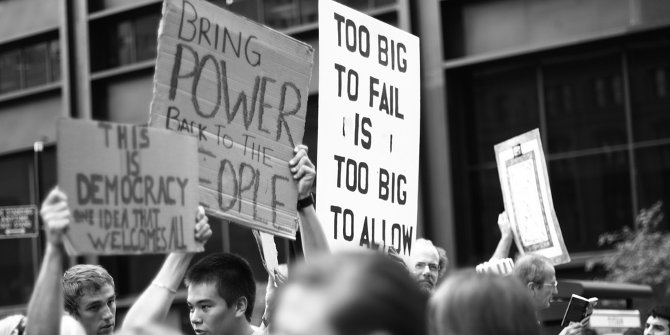 The last decade has seen extensive protest movements across Europe and the rise of new ‘populist’ political parties. These developments have frequently been explained in terms of popular opposition to the economic system and neoliberalism, but to what extent are these developments really reflective of resistance to neoliberal policies? Drawing on a new study based on interviews with activists in Athens, Cairo and London, Armine Ishkanian highlights that activists often view the current economic system as being fundamentally incompatible with their conception of democracy, but that the term ‘anti-neoliberal’ fails to capture the full extent of their political positions and policies.
The last decade has seen extensive protest movements across Europe and the rise of new ‘populist’ political parties. These developments have frequently been explained in terms of popular opposition to the economic system and neoliberalism, but to what extent are these developments really reflective of resistance to neoliberal policies? Drawing on a new study based on interviews with activists in Athens, Cairo and London, Armine Ishkanian highlights that activists often view the current economic system as being fundamentally incompatible with their conception of democracy, but that the term ‘anti-neoliberal’ fails to capture the full extent of their political positions and policies.

Credit: Aaron Bauer (CC BY 2.0)
Many now speak about the current era as the age of anger and populism. Indeed, given the way this decade began, with waves of protest movements and square occupations, and given the recent victories for Donald Trump and Brexit, such characterisations are not entirely out of place. But in examining the rising discontent and anger, we need to ask not only what drives people to protest, but what actions they undertake in addition to and beyond protesting.
While only some of the recent movements, most notably Occupy, articulated an explicit critique of global capitalism and neoliberalism, the Indignados in Spain and Greece, the Gezi Park protests, and the Arab revolts all linked protests against growing inequality and precarity with demands for ‘real’ democracy. In a recently published article, my co-author Marlies Glasius and I examine how activists in three cities where there were active square occupations in 2011-2012 (Athens, Cairo, and London) framed the linkages between capitalism and democracy and whether and how they understood their activism as resistance to neoliberalism.
We found that despite the differences in political and economic systems across our three cities, there were shared understandings. The majority of our respondents articulated deeply intertwined critiques of the economy and the political system that often encompassed, but also went beyond, critiques of neoliberalism and embodied wider concerns about the weakening of democracy. The squares movements brought together individuals who had shared grievances around the current economic and political systems, but also diverse political and ideological positions on the causes of the crisis and possible solutions.
While investigating both anti-austerity protests and protests for democracy, we found that the critiques of the economy were inextricably linked to critiques of the current political system and of the shortcomings of representative democracy, in ways that the term ‘neoliberalism’ does not fully capture. We examined how activist demands for social justice were translated into concrete practices of solidarity and self-help. In researching the after-life of square occupations, we found how activism has survived and developed beyond the square through the development of grassroots solidarity initiatives.
We discovered that solidarity initiatives created by activists have begun to fill in the gaps left by the absent or receding state. Activists involved in these initiatives described their solidarity actions as political interventions and not philanthropic acts of charity. As such, they can be seen as representing an inherent rejection and subversion of the neoliberal logic which prioritises individual responsibility over the collective meeting of needs. Some activists overtly criticised the neoliberal trope of individual responsibility as a “nasty” or hypocritical discourse, arguing that while individuals were expected to act in a responsible manner, state institutions were not always, let alone consistently, held to the same standards of responsible behaviour.
The last finding is significant in that it shows that in all three cities activists not only criticised the failure of states to meet the needs of vulnerable citizens and to deliver social justice, but that they also began to develop localised responses and coping mechanisms. In recognising the important role solidarity initiatives played in helping people to survive in the context of crisis, none of our respondents considered such initiatives as permanent solutions that were intended to absolve the state of its responsibilities. While we have concerns about the degree to which such types of solidarity initiatives can be scaled up, it is important to recognise them as not only practices of resistance to neoliberalism, but more importantly as attempts to construct alternative economic and societal models.
Of our three cities, Athens had the most solidarity initiatives, as activists spoke about the failure of the state to deliver services, to support those affected by the crisis, and how the state’s failures had led to the rise of solidarity initiatives. One of the slogans of the protestors was “No One Alone in the Crisis”. Solidarity actions in Greece included electricity reconnections to homes that were unable to pay their bills; the creation of food distribution networks; and the opening of solidarity centres in different neighbourhoods which provided hot meals, second hand clothing, classes, lending libraries, and other support. It is notable that since 2015 Greece has also been on the frontline of the so-called ‘migration crisis’ and solidarity initiatives, including the squatted City Plaza Hotel in Athens and the Pikpa Solidarity camp in Lesbos, represent a continuation and expansion of solidaristic action which began as a coping mechanism against austerity to also support migrants.
In studying the after-lives of the squares movements, we note that translating diverse grievances into coherent strategies for action in many instances has been difficult and in some cases, it has led to dissipation and fragmentation. The prospects of activist conceptions and practices of social justice, solidarity and democracy bleeding outward and upward into the transformation of society and of political decision-making are bleak.
Instead, in Greece, in the UK and all over the western world, nativist populist movements have been on a rising trajectory, based at least in part on very similar sentiments of discontent with electoral politics and neoliberal policies. Egypt on the other hand represents an extreme case of a new type of governance that is as neoliberal as ever in its economic orientation, but much more repressive in its dealings with discontent. Given the ideological heterogeneity of recent movements, it remains to be seen what new alliances and fissures will emerge between the disaffected as they critique and contest the political and economic status quo.
But in recognising the role solidarity initiatives play, we should also be cautious. In the absence of the state in the context of social welfare, it is not always progressive actors who move in to fill the gaps and needs of populations who feel left behind. Emerging evidence from Britain, Greece, and Italy demonstrates how right-wing movements and fascist political parties (e.g., the British National Party, CasaPound in Italy and Golden Dawn in Greece) are using social welfare delivery, including food banks and free medical services, to win the hearts and minds of those who are suffering from growing poverty and precarity.
Please read our comments policy before commenting.
Note: For more information, see the author’s co-authored journal article in Critical Social Policy. This article gives the views of the author, not the position of EUROPP – European Politics and Policy or the London School of Economics.
_________________________________
 Armine Ishkanian – LSE
Armine Ishkanian – LSE
Armine Ishkanian is an Associate Professor in the Department of Social Policy at the London School of Economics.





Everyone loves blaming politicians / the elite. Nicholas Taleb has wrote a recent book about this, on how the Elite have no ‘Skin in the Game’, and are shielded from their actions.
I’m not about to rebut this, I think the elite do have some blame (as do I think moral hazards definitely occur from elites being able to defer risk from themselves onto others). But I have been thinking, and propose another hypothesis, which is that voters in general also deserve blame.
Voters will vote for more housing regulation, as a means of combating rising housing prices, with the result actually being higher housing prices (see recent RBA study).
They will claim they’re anti-Russian, and support Western interests, while simultaneously supporting movements directly supported by Russia (in Russia’s interests).
They will want higher wages, but support policy that lowers wages.
Voters are the driving force for policy proposals. Politicians develop policy under the pretense of winning votes and being elected. They very carefully and specifically spend months / years doing studies, determining public sentiment, and carefully crafting policy considering the likihood of votes. Thus it’s all too easy for politicians to offer poor policy, due to the public demanding it. Yet all blame for poor policy (or policy outcomes / unintended consequences of policy) then gets deflected from the electorate who voted for this very policy to the politicians / elite class. Sure, politicians are responsible and accept blame, but so are voters, yet we never see voters taking their share of blame. They are the perfect class who cannot be blamed, they have their own degree of ‘deflection’ / no skin in the game going on, to some extent at least one can argue. Naturally no politician would ever dare pin blame on the voters who demanded / voters for this policy, however, as that would be political suicide to tell the truth, that voters have no idea what they’re doing. A politician saying that will never be elected again, or an analyst saying that will be chased out of the discussion.
Most voters fail to understand wider macro importances and implications. None of them seriously know geopolitics to any degree, or macroeconomics, or how the world operates. They will vote to see the erosion of their national power / relevance. If it wasn’t for central banks operating monetary policy, voters would most probably vote for hyperinflation if they could. Moving forward is it obvious voters in the West (Europe and US, but I argue particularly Europe) seem keen on voting the West out of the global competition, and into global irrelevance. They seem keen on transferring all global power to other nations. They seem keen on voting for anti-competitive policy, thus further slowing growth. For whatever reason, they think this is quite a good idea. Their ideas regularly don’t make logical sense, are filled with logical loopholes / flaws, are based on lowest common denominator self-interests (i.e. a ‘free’ bus pass etc). Western voters have much to answer for.
On another note, so called ‘neoliberalism’ as implemented in Europe is a retardation of the word. Naturally things in the real world are never as clear cut as nice theoretical labels / concepts in the world of theory.